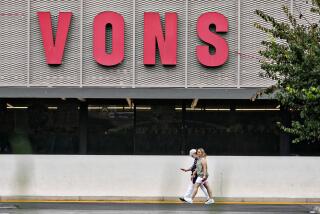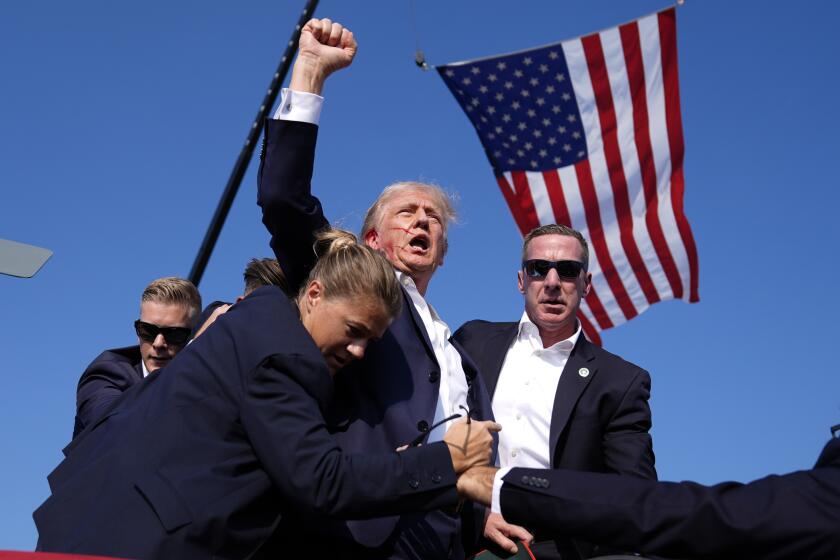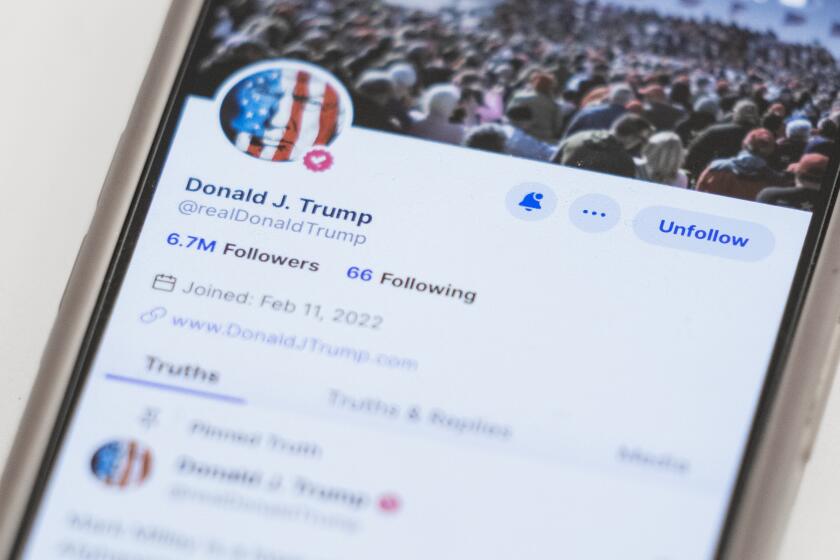PUC’s vote on AT&T; to test panel
With a majority of its members now appointees of Gov. Jerry Brown, the California Public Utilities Commission is poised to end its customary hands-off approach to regulating wireless carriers by ordering an investigation into AT&T; Inc.’s proposed $39-billion takeover of T-Mobile USA.
Thursday’s vote on whether to launch a full-fledged investigation is the first major test of the newly reconstituted panel’s willingness to take a more active role on behalf of consumers in the industries it regulates.
Findings could lead the commission to recommend additional conditions -- shorter contracts, lower termination fees, fines for dropped calls, for example -- that might not be imposed by the Federal Communications Commission and the U.S. Justice Department, both of which must approve the deal. Lawyers said it’s unclear whether the PUC has authority to block the combination in California, the nation’s largest telecom market.
AT&T; has said it expects the deal to go through by early next year, despite significant objections from consumer groups and such key lawmakers as U.S. Reps. Edward J. Markey (D-Mass.) and John Conyers Jr. (D-Mich.).
“We’re pleased that the commission appears to be exercising more of the authority that it’s always had but, in the past decade, did not exercise over wireless,” said Mark Toney, executive director of the Utility Reform Network, a consumer advocacy group.
A departure from past practice wasn’t something the industry had anticipated because some believe that the PUC’s jurisdiction over telecom was “a bit muddy,” said Samuel Kang, general counsel of the Greenlining Institute, which represents working poor and minority communities.
Kang said the commission’s new attitude could be traced partly to Brown’s appointment of Catherine Sandoval, a Santa Clara University law professor who specializes in telecommunications issues. The agency’s previous telecom expert, he said, was not only “pro-industry but also anti-consumer.”
Sandoval said at a May 26 public meeting that an examination of the deal should look at issues of competitiveness, technology and product availability. The five-member PUC voted unanimously then to ask staff to prepare the recommendation for Thursday’s vote.
“There has been an increase in consolidation in the wireless industry,” Sandoval said. “It’s appropriate to create the opportunity for the public to weigh in on the merger ... to develop a record.”
California has long been the nation’s largest cellphone market, and AT&T; and Verizon Wireless have been the mobile leaders. Neither company would comment on the PUC’s upcoming vote. Sprint Nextel Corp., the nation’s third-largest cellphone company, has opposed the deal.
An affirmative vote by the PUC would continue to freeze a 30-day automatic approval process that started May 3 when AT&T; informed the commission of its intention to acquire T-Mobile. It also would make California the second state after Louisiana to open a legal proceeding.
The $39-billion mega-deal, which would leave the country with two carriers controlling as much as four-fifths of the market, has drawn sharp criticism in many circles. Consumer groups contend that the acquisition would stifle competition, limit innovation and lead to higher prices as AT&T; shifts to more costly and profitable products.
“We’re going to go from four industry competitors down to 21/2,” Kang said. “The merger, as it’s proposed, we think will be hurtful to low-income customers.”
Nationwide, Verizon Wireless has about 95 million subscribers, AT&T; 90 million, Sprint 51 million and T-Mobile, a unit of Deutsche Telekom, 32 million.
In its notice to the commission, AT&T; said that combining with T-Mobile “will provide significant public benefits,” mainly by freeing up needed Internet spectrum.
Such a move would “improve voice and data service, especially in constrained areas, increase network capacity and efficiency and expand geographic coverage for T-Mobile customers,” AT&T; said.
The combined network would make the latest generation of wireless technology, called 4G, available to 97% of the U.S. population, AT&T; said. At least 1 million more Californians would gain access to 4G service if the AT&T; and the T-Mobile networks were combined.
To make its case, AT&T;, which has a long history of supporting local charities and nonprofit organizations, has flooded the PUC and FCC with letters of support and testimony from scores of groups representing its labor unions, seniors, ethnic communities and local chambers of commerce.
“AT&T; is very good at making friends,” Kang said. “They’ve been very good at reaching out before they needed something” from government agencies and lawmakers.
Verizon Wireless is not contesting the merger.
A number of high-tech companies and venture capital firms, including Facebook Inc., Google Inc., Yahoo Inc. and Microsoft Corp., also told regulators they supported the merger as “a near-term means of addressing the rising consumer demand.”
Sprint isn’t buying those arguments.
A merger would create “a structural change for the wireless market,” said Ken Schifman, Sprint’s general counsel. “It will make it much harder for smaller players like Sprint to get access to the latest and greatest handsets, and it will make it harder to get network equipment makers to get technology consistent with the technology that Sprint uses.”
Ratepayer and consumer groups question the purported advantages to the acquisition. The Utility Reform Network’s Toney, for instance, is skeptical about AT&T;’s claims that the merger would create new jobs as well as foster economic development.
“These are questions we need much better answers to,” he said, “because AT&T; is being vague.”
--







